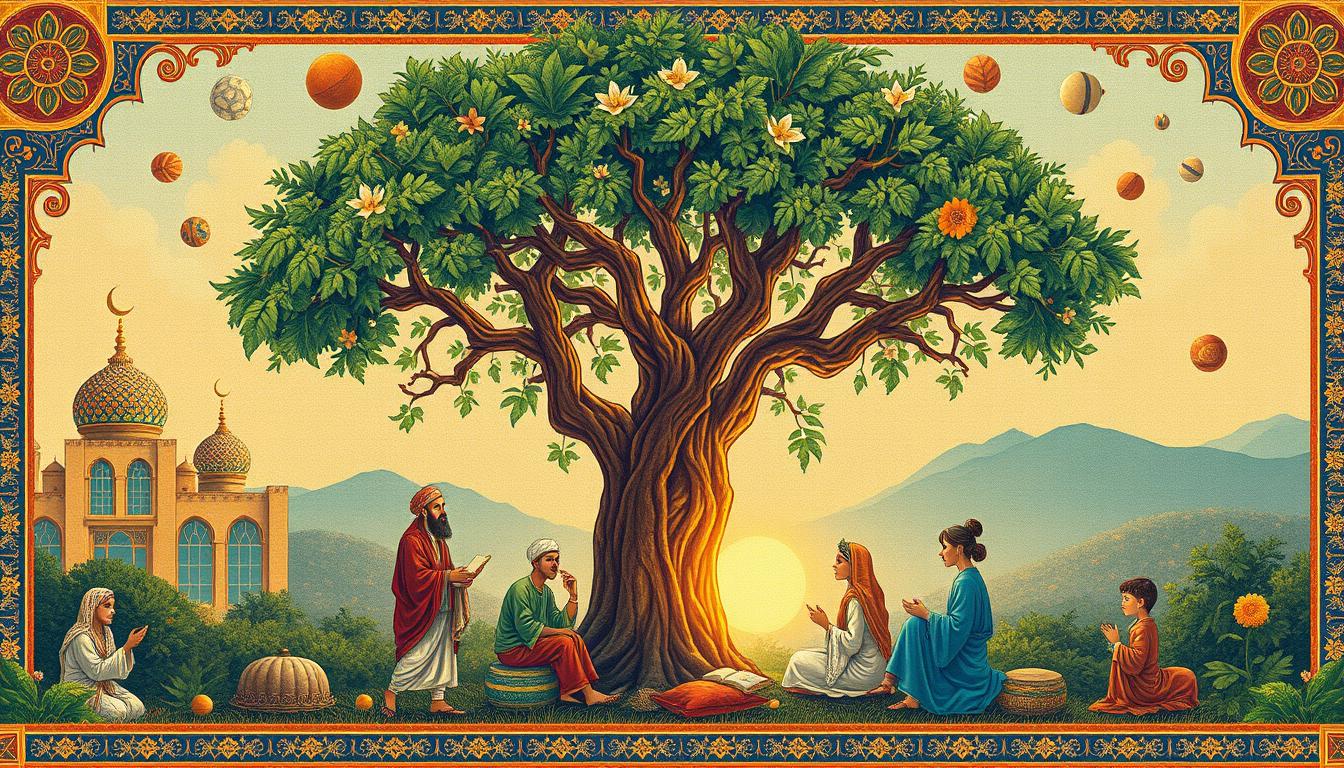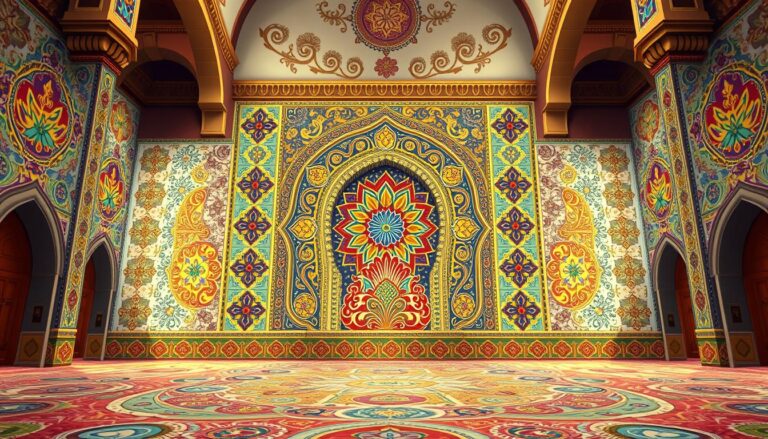Islamic Reform and Revival: Navigating Modern Challenges
Can Islam keep up with the fast pace of the 21st century while staying true to its roots? This is the core question of Islamic reform and revival. These movements aim to connect traditional Islamic values with the needs of today’s world. The idea of progressive Islam has become a key solution for Muslims facing today’s challenges.
Islamic modernism started in the 19th century and still influences Muslim thought today. Leaders like Sir Sayyid Ahmed Khan and Muhammad Abduh introduced a new way of understanding Islam. They combined Islamic faith with modern values like democracy and civil rights, inspiring many Muslims to reevaluate their faith.
Now, globalization and new technologies add to the discussion of Islamic reform. Social media and Western cultural influence challenge traditional Islamic practices. Muslims must find ways to align their faith with today’s society.
Key Takeaways
- Islamic reform seeks to adapt religious teachings to modern contexts
- Progressive Islam aims to balance tradition with contemporary needs
- Globalization and technology present new challenges for Muslim societies
- Key figures in Islamic modernism promoted rational thinking and scientific progress
- Social media plays a significant role in shaping modern Islamic discourse
The Roots of Islamic Revival in the Modern Era
The Islamic revival movement started as a reaction to European colonialism. It also came from the decline of Muslim political power in the 19th century. Reformist movements aimed to tackle the challenges Muslim societies faced in the modern world.
Historical Context of Islamic Reform Movements
European imperialism brought political, economic, and cultural challenges to Muslim societies. In response, reformist ideologies emerged. They focused on educational reform and reinterpreting Islamic texts.
The Ottoman Empire made administrative and legal reforms from 1839-1876. They even set up a constitutional monarchy.
Key Figures in Early Islamic Revival
Important thinkers shaped contemporary Muslim thought. The Wahhabi movement, started in 18th century Arabia, influenced conservative Islamic movements worldwide. Muhammad Ali Pasha of Egypt began modernization efforts in the early 19th century.
The Deobandi school aimed to keep traditional Islamic scholarship alive. The Aligarh movement, on the other hand, focused on modern education that combined Islamic and Western knowledge.
Influence of Colonialism and Western Modernity
Colonialism and Western modernity had a big impact on Islamic reform movements. Islamic modernists revived the concept of ijtihad. They promoted scientific education and research.
They also challenged traditional views on women’s rights in Islam. The Iranian constitutional revolution of 1905-1911 aimed to limit the monarchy’s power. It sought to establish the rule of law, influenced by Western political ideas.
- Salafism advocated a return to early Muslim practices
- Pan-Islamism aimed to advocate unity among Muslims globally
- Islamic constitutionalism sought to reconcile Islamic principles with modern governance
These reformist movements set the stage for contemporary Muslim thought. They continue to influence Islamic discourse in the modern world.
Defining Islamic Reform and Revival in Contemporary Context
Today, Islamic reform and revival mean many things. They range from strict scriptural interpretations to the spiritual practices of Sufism. Progressive Islam and Islamic modernism are at the heart of these changes.
In Arabia, the Wahhabis, in Nigeria, the Sokoto Caliphate, and in India, Shah Wali Allah of Delhi’s neo-Sufism show different sides of Islamic revival. These groups tackle today’s problems, aiming to impact politics while keeping Islamic values.
A study in October 2008 looked into renewal, reform, and independent thinking in Islam. It covered pages 11-25, highlighting how these ideas help balance tradition and modernity in Islam.
Islamic reform is not a single idea, but a variety of ways to tackle today’s challenges while keeping important religious values.
Progressive Islam focuses on fairness, equality for all, and talking with people of other faiths. It tries to understand Islamic teachings in today’s world. Islamic modernism, meanwhile, tries to mix Islamic beliefs with modern values and science.
As we move into the 21st century, these reform efforts keep growing. They are shaping what Islam will be like in a world that’s always changing.
The Impact of Globalization on Islamic Thought
Globalization has changed how Muslims think today, bringing new challenges. The world is now more connected politically and economically. This has led to different views within Islamic communities.
Cultural Dominance and Islamic Identity
The fast flow of goods and people across borders worries many. Muslims face the challenge of keeping their Islamic identity strong while being part of global trends. This issue is seen in debates over dress, entertainment, and social norms.
Technological Advancements and Religious Practice
Technology has changed how people practice their religion. Now, there are online Quran classes, virtual mosque tours, and digital fatwa services. These tools make Islamic knowledge more accessible but also raise questions about its authenticity and authority.
Social Media’s Role in Islamic Discourse
Social media has become a place for shaping Islamic discussions. It allows many voices to join in religious debates, challenging old ways. A 2005 study showed how groups like Egypt’s Wasat party use digital spaces to share new views of Islam.
“Islam is a globalized religion, with past Muslim contributions impacting various aspects of contemporary globalization.”
As Muslims deal with these challenges, four main responses appear: traditionalist, liberal modernist, fundamental revivalist, and Islamist-transform. This variety shows how Islamic thought is evolving in a globalized world.
Reconciling Tradition with Modernity: Key Challenges
Islamic reformists face a big challenge in mixing old traditions with new ideas. They must deal with social problems while keeping important religious values. This balance has been a long-standing issue since the 18th century.
The Wahhabi movement, started by Muhammad ibn Abd al-Wahhab, shaped conservative Islamic views worldwide. On the other hand, the Aligarh movement in India, led by Sir Syed Ahmad Khan, aimed to modernize Muslim leaders. These different paths show the wide range of reform efforts in Islam.
Education is key in bridging the gap between old Islamic knowledge and new ideas. Reformists want to prepare Muslim leaders to face today’s challenges while staying true to Islam. Muhammad Abduh’s work in Egypt is a great example of this.
“The need to balance foundational values with modern necessities in a global context is paramount for Islamic reformists.”
Political reforms are also important in blending tradition and modernity. The Ottoman reforms from 1839-1876 and the Iranian constitutional revolution of 1905-1911 tried to update governance while keeping Islamic values. However, these efforts often met opposition from those who wanted to stick to traditional ways.
As Muslims deal with the modern world, the challenge of mixing tradition and modern needs is ongoing. This journey requires careful thought on social justice, economic gaps, and the changing global scene. All this must be done while keeping the core of Islamic teachings.
Islamic Reform and Revival: Navigating Modern Challenges
Islamic reform movements are tackling today’s social issues with a faith-based approach. They mix traditional religious values with modern society’s needs. This creates a path for progressive Islam.
Addressing Social Issues
Muslim reformers are tackling problems like poverty, inequality, and environmental concerns. They use Islamic teachings to guide social justice and community development. This makes religious principles relevant to today’s challenges.
Balancing Tradition and Modernity
Finding harmony between religious values and modern life is a key goal. Reformers aim to interpret religious texts in ways that respect tradition and meet contemporary needs. This balance is crucial for the growth of progressive Islamic thought.
Education’s Role in Reform
Education is vital for fostering progressive Islam. Schools and universities are updating their curricula. They include critical thinking and diverse interpretations of Islamic texts. This educational shift helps create a new generation of Muslims who can engage with both their faith and the modern world.
“Education is the key to unlocking the full potential of Islamic reform and revival in the face of modern challenges.”
By addressing social issues, balancing tradition with modernity, and emphasizing education, Islamic reformers are paving the way. They are creating a more inclusive and progressive interpretation of their faith. This approach allows Muslims to actively engage with contemporary challenges while staying true to their religious roots.
Women’s Rights and Gender Equality in Islamic Reform
The push for women’s rights in Islam has grown stronger in recent years. Progressive Islam aims to tackle gender inequality while honoring Islamic values. It sees women as essential in education, culture, and community building.
Islamic feminism is now part of a global conversation. It draws from the Quran, focusing on equality as a key principle. This movement questions old interpretations of Islamic law that often favor men.
Statistics show a complex situation:
- Islam has over 1.6 billion followers worldwide
- One in four Muslim Arabs support gender equality
- Women’s labor participation in Muslim-majority countries has stalled for decades
Progressive Islamic thinkers say male-dominated views have caused gender inequality. They want to re-examine religious texts with a new perspective. They focus on equality, a core Islamic principle.
“Equality forms a fundamental component of Islamic feminism, grounded in the Quran.”
The path to gender equality in Islamic societies is tough. Religious fundamentalism often blocks new views. But, the growing talk about women’s rights in Islam is a positive sign. It’s a key step in blending religious values with today’s needs.
The Role of Islamic Scholars in Shaping Modern Muslim Thought
Islamic scholars are key in shaping today’s Muslim thought. Their impact goes beyond religious circles, affecting society and norms. This shows how Islamic views are evolving in the modern world.
Contemporary Fatwas and Their Societal Impact
Fatwas, or religious rulings, shape Muslim societies. They tackle issues like social media and medical ethics. Scholars try to mix old teachings with today’s needs, leading to debates in Muslim communities.
The Influence of Islamic Institutions
Al-Azhar University in Egypt is a major center for Islamic learning. Its scholars have a big impact on reform across the Muslim world. Other places, like the International Islamic University Malaysia, also play a role in global Islamic discussions.
Debates on Ijtihad and Religious Interpretation
Ijtihad, or independent reasoning, is key to Islamic reform. Scholars argue over its use in solving today’s problems. This debate shows how Muslim thought is changing and how reformers try to blend tradition with modernity.
“The rise of Islamic activism since the 1970s has led to increased scrutiny of Muslim culture and religion in the West.”
Islamic scholars must deal with complex issues while keeping their faith strong. Their efforts shape Islam’s future in our connected world. They influence both religious practices and wider societal norms.
Combating Extremism and Promoting Religious Tolerance
Islamic reform movements are key in fighting extremism and promoting religious tolerance. They aim to challenge extremist views of Islam. They push for a faith that welcomes everyone.
A survey in eight countries showed the need for a strong plan against violent extremism. The CSIS Commission on CVE suggested a $1 billion U.S. government pledge for this effort.
The commission’s report lists eight key steps to fight extremist views:
- Education reform to prevent extremist teachings
- Enhancing respect for religious diversity
- Reinforcing community resilience
- Focusing on community-led prevention
- Aligning policies with values
- Mobilizing military and law enforcement tools
- Deploying leadership from the White House
- Expanding CVE models and funding proven efforts
Promoting religious tolerance is key for Muslim communities today. The Carter Center held a symposium in 2017. It brought together 30 experts to tackle Islamophobia, media, and political violence.
By allowing official religious institutions some autonomy, regimes can enhance their monitoring ability and the integrity of religious officials, but they also lose some control and indirectly create spaces for critics to organize.
Arab states have big, official Muslim religious bodies. They handle education, prayer, family law, and broadcasting. While regimes control these, they can’t fully manage them. Acting too much in religious matters can harm the faith’s image and push critics underground.
Islamic Reform in Politics: Case Studies from Turkey and Beyond
The mix of Islamic modernism and politics gives us a peek into the changing world of Muslim-majority countries. Turkey is a key example of how reformist movements change how governments work and what policies they make.
The Justice and Development Party (AKP) and Islamic Governance
Since 2011, Turkey’s AKP has worked to change from a parliamentary system to a presidential one. This change shows the party’s Islamic roots and its current conservative views. The AKP mixes Islamic values with modern government, affecting education, social care, and laws.
Challenges to Secularism in Muslim-Majority Countries
The Diyanet, started in 1924, is crucial in Turkey for managing religion. It shows the tricky relationship between state and faith in countries that seem secular. Scholars like Berkes, Karpat, and Mardin have looked at this relationship, from the Ottoman era to today.
Impact of Islamic Revival on Regional Dynamics
Islamic reform movements are not just in Turkey but across the Muslim world. Kuru and Stepan’s studies show how Islamic activism works in democracies. This is seen in places like Indonesia, Egypt, and Iran, where new ideas shape politics and policies.
- Balancing tradition with modernity
- Role of religious scholars in politics
- Influence of global Islamic thought on local governance
The mix of Islamic modernism and politics keeps changing, bringing both challenges and chances for Muslim-majority countries. They face the complex task of moving through the modern world.
Conclusion
Islamic Reform and Revival faces many challenges today. It must stay true to its values while adapting to new times. This movement has shaped Muslim societies for centuries, from the colonial era to now.
Progressive Islam offers hope, focusing on justice, human rights, and being inclusive. It tries to mix modern values like equality into Islamic thought. Efforts to update Islamic law aim to tackle today’s issues directly.
Education is key in this journey, helping clear up wrong ideas about Islam. Technology connects Muslims worldwide, opening new paths for dialogue and change. This mix of old and new values creates a vibrant, evolving space for believers.
Islamic Reform and Revival keeps evolving, playing a big role in shaping Muslim futures. By blending progressive ideas with its rich heritage, Islam shows it can adapt and grow in a changing world.
Source Links
- Islamic Modernism: Navigating Tradition and Change
- No title found
- Modern Western Thought and Islamic Reformism: Intellectual Challenges, Prior Discourse, and Future Prospects
- Religions
- Islamic modernism and reform movements | Islamic World Class Notes | Fiveable
- The Concept of an Islamic Reformation
- 1 The Concept of “Reform”
- The Islamist Alternative to Globalization
- Islamic culture and globalisation: Challenges and responses
- Challenges of Islamic Modernism in the Indo-Pakistan Subcontinent
- Reformation of Islamic Thought. A Critical Historical Analysis
- Book Review: The Revival of Islam in the Balkans: From Identity to Religiosity edited by Arolda Elbasani and Olivier Roy
- BEQ_2000021 210..241
- Muslims, Human Rights, and Women’s Rights
- Revisiting the islam-patriarchy nexus: is religious fundamentalism the central cultural barrier to gender equality? – Zeitschrift für Religion, Gesellschaft und Politik
- Contemporary Islamic thought | Islamic World Class Notes | Fiveable
- Turning Point
- CC_Islamophobia_8_18_D.indd
- Official Islam in the Arab World: The Contest for Religious Authority
- Politics and Islam in Turkey
- Ahmet T. Kuru







